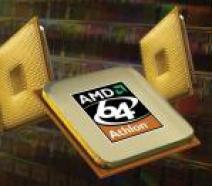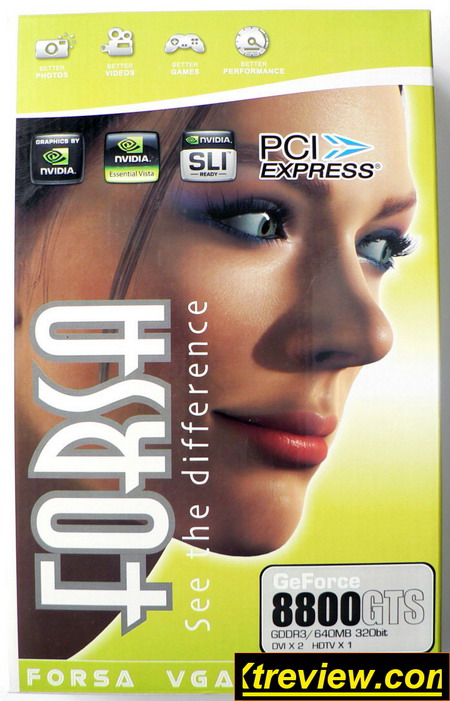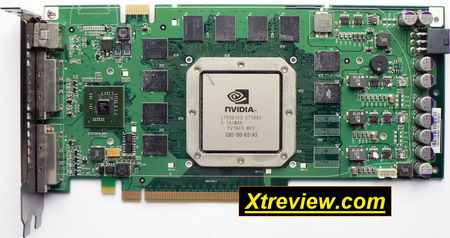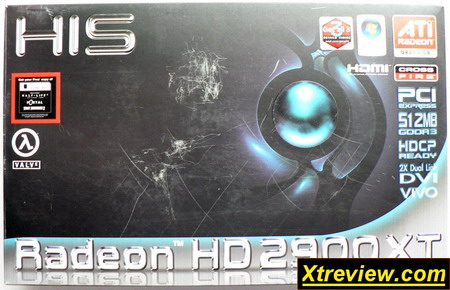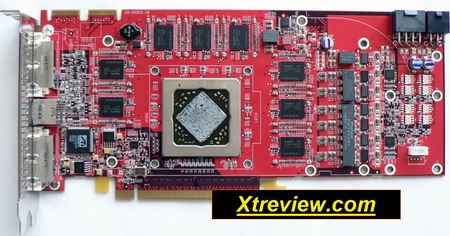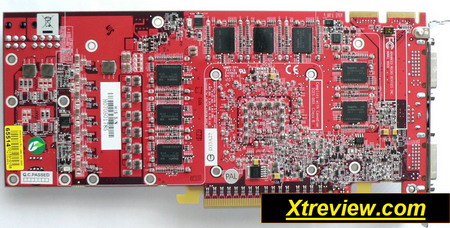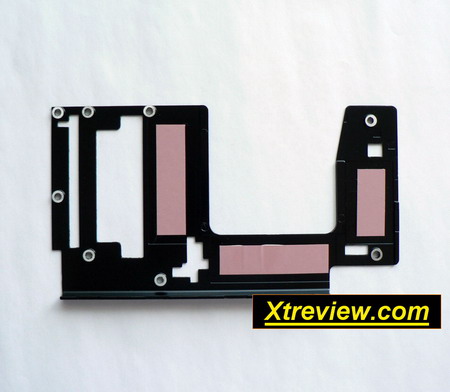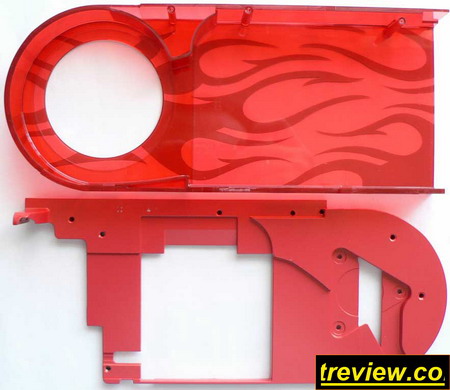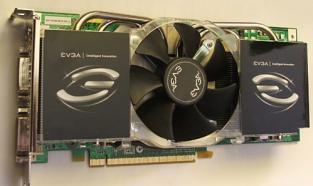RADEON HD 2900 XT 512 MB VS 8800 GTS REVIEW OVERCLOCKING AND BENCHMARK
![]()
|
|
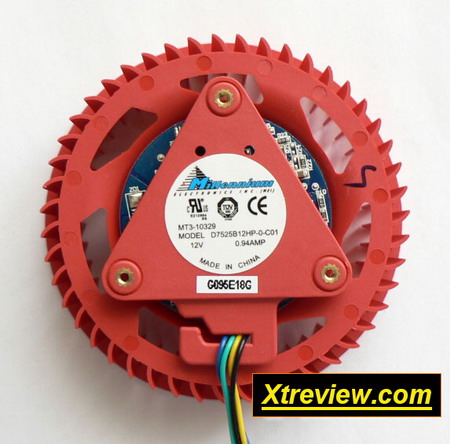 |
||||||||||||||||||||||||||||||||||||||||||||||||||||||||||||||||||||||||||||||||||||
| Posted:2007-07-20 By Video card review Number of View:68109 |
|||||||||||||||||||||||||||||||||||||||||||||||||||||||||||||||||||||||||||||||||||||
By :Video card review Posted:2007-07-20
Today review is the logical continuation of previous HD 2900 XT review . We used the latest official drivers; In addition to 1600 X 1200 resolution ; We introduced in this review four new games; All benchmark where under Windows vista and DirectX 10 in addition to windows xp for DX 9 games ; We used one kilowatt power unit ..... 1. Technical characteristics AMD radeon HD 2900 XT and NVIDIA GeForce 8800 GTSThe fundamental technical characteristics of AMD radeon HD 2900 XT and NVIDIA geForce 8800 GTS are presented in the following table:
* - 64 blocks, contain one scalar and one vector processor, which consists on four components, controlled by one block; 2. Forsa GeForce 8800 GTS 640 Mb reviewGeniman international limited (GIL) release video card geForce 8800 GTS 640 MB under the brand forsa.  This video card is pretty similar to nvidia reference video cards. At least this company release a wide video card spectrum , that have the precise copy of NVIDIA reference design . So there is no interesting special features in forsa products (as high frequencies, original cooling systems .....) Perhaps, the only advantage against competitors is the price . This video card is supplied in small flat box, on face side we have a large girl image (from NVIDIA demo) . There are indicated: the video card model, the memory volume and the width of the system bus , and also possible connection equipped in the GeForce 8800 GTS:
In the back side we have the detailed architecture and technologies description , utilized in the graphic processors NVIDIA G80. Furthermore, we have the complete technical characteristics Of geForce 8800 GTS and GTX, and also the special features of those video card. Here is the delivery set . It is too poor for so expensive video card ... : 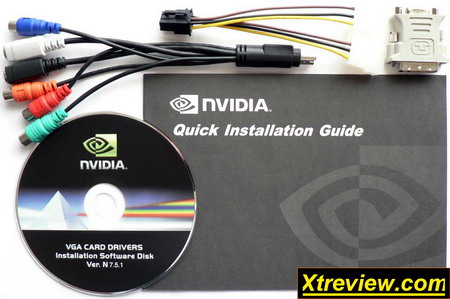 In the number of accessories, supplied from Forsa with the GeForce 8800 GTS 640 MB., we have the following components:
As it is evident, nothing special. 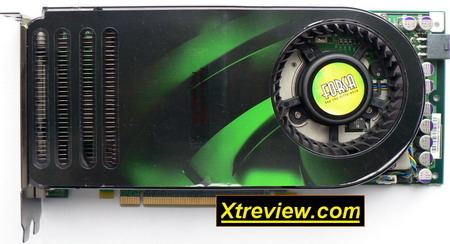 This video card is equipped with two DVI- I (dual link with high resolutions support ) and a TV- out. 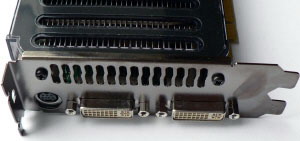 Let us recall that the VIVO functions as rule is not supported in video card NVIDIA geForce 8800 GTX/GTS . Here is how appears the GeForce 8800 GTS without cooling system:
The entire video memory volume ( 640 MB) is located in the face side , in contrast to Radeon HD 2900 XT. In the left PCB side we have the MIO connector , and also the NViO NVIDIA microcircuit . In the right side we have six-contact additional power connector (NVIDIA recommend for GeForce 8800 GTS power units with 400 W with not less than 20 A in the 12- voltage channel ). The graphic processor G80 revision a3 is released in Taiwan in 18th week 2007: 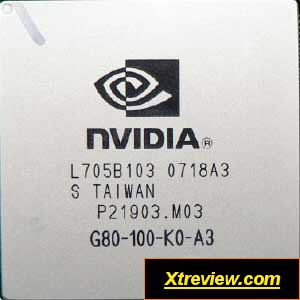 Let us note that many today sold video card on G80 chip are using the revision a2, now we have the new chip revision . The Default frequency of graphic processor is 513 MHz. Its shader block functions at 1188 MHz. Just as all reference GeForce 8800 GTS . Ten memory microcircuits standard GDDR- 3 are released by samsung company :  The chips Marking K4J52324QE-BC12 talk about the default memory access time , witch is in our case 1.2 NS and the theoretical frequency is 1667 MHz. According to monitoring data , the memory functions at 1584 MHz , and the system bus width (exchange between video card memory ) is equal to 320 bits. Let us note that the memory frequencies in both 2d and 3d- regimes are identical. The cooling system Of geForce 8800 GTS was already examined earlier; therefore here it \'s the back side photo:  So much thermal-pastes!!!!!!!!. Before talking about the overclocking potential of this video card, let us verify, the effectively of its cooling system . Cooling system test was conducted in closed case at room temperature equal to 24 degree Celsius. We used a loop of test firefly forest from the synthetic graphic benchmark 3DMark 2006 with anisotropic filtration 16x and full screen antialiasing 4x . As a result with the default frequency we obtained the following temperature for forsa geForce 8800 GTS 640 MB.: 80C --> Core temperature during load and 66c in idle state 63c -->Ambient temperature during load and 54c in idle state Cooler RPM 1629.94 in idle and load condition. So , the graphic processor reached 80 degree Celsius, which is sufficiently modest for contemporary measures. Focus attention, that in this case the fan did not even increase its rotation, functioning quietly (34.4 DB, 1 m). The maximum being ~ 2800 RP/min with the noise level 39.5 DB, this is not completely quiet, but in the same time not critical , in our view. Know we do the same test but using the maximum fan speed to check again the cooling system effectiveness : 65C --> Core temperature during load and 55c in idle state 50c -->Ambient temperature during load and 43c in idle state Cooler RPM 2799.38 in idle and load condition. However, in our view, the optimum for noise level is at ~1950 RP/min. So increasing the fan speed help the video card a lot ---> 15c lower under load From the default frequency 513 MHz without loss in stability and image quality , the graphic processor succeeded to overclock up to 648 MHz or + 26%. Not bad result. The Overclocking potential of video card memory proved to be even better : its frequency grew from 1584 MHz to 2160 MHz or + 36% over the rating: Let us recall that the frequencies of the fastest present video card geForce 8800 Ultra are 612/2160 MHz, and for Forsa geForce 8800 GTS , it was possible to overclock even more . In this case , let us again note , that in GeForce 8800 GTX/ultra versions the numbers of stream processors are equal to 128 against 96 in GTS, in addition the memory volume is larger from 640 to 768mb . After video card overclock we check again its temperature conditions ( the fan rotation frequency was set manually to 1950 RP/min): 76C --> Core temperature during load and 58c in idle state 57c -->Ambient temperature during load and 46c in idle state Cooler RPM 1974.41 in idle and load condition. The results just impress : only 76 degree Celsius for the chip and 57 as environment temperature in the peak load for the overclocked video card! 3. HIS radeon HD 2900 XT 512 Mb (H290XT512DV- R) reviewToday we will will check the well know Radeon HD 2900 XT from HIS company . On the face side is indicated the video card model , volume and type of the installed memory and and also possible connection interface :
On the back side are presented the fundamental technical characteristics, system requirements and the list of rewards, obtained by HIS production . The video card delivery set appears as follows:  Here is the complete set from HIS Radeon HD 2900 XT :
HIS traditionally equips their video card with effective and quiet cooling systems, we expected to see something larger than the usual reference cooling system in radeon HD 2900 XT: 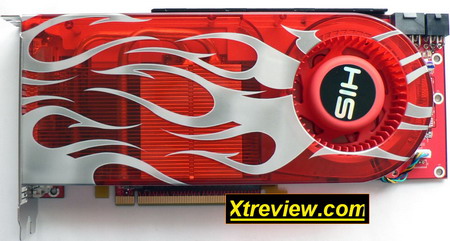 But before us the complete copy of reference design radeon HD 2900 XT . Similarly to GeForce 8800 GTS, this video card is equipped with two DVI- I (dual link) and TV- out. 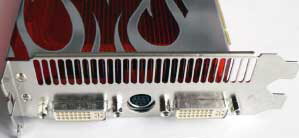 On the video card back side is fixed the metallic plate, which closes the memory chips and which make contacts with them using the thermal interface: 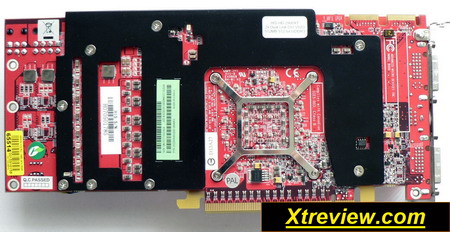 Without cooling system the radeon HD 2900 XT appears as follows:
Eight memory chips are located in the face side and eight in the back one. In the right and upper video card PCB part are installed two port for additional power connection : one six-pin, and one 8 pin . The graphic processor is now located at the angle, but marking is not written on the chip, but on the metallic shield : 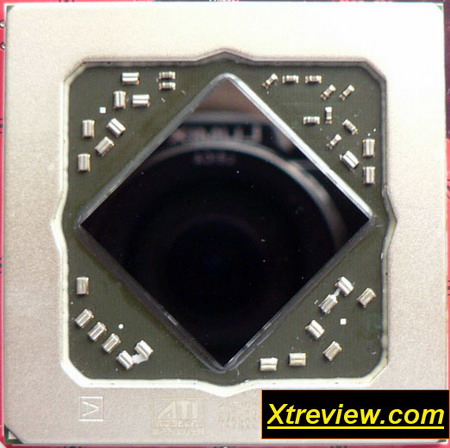 The default GPU frequency is 740 MHz (743 MHz according to the monitoring data ). Some of its characteristics are available in the table above. The frequency of shader block in Radeon HD 2900 XT is equal to the graphic processor frequency , whereas in GeForce 8800 GTS the shader block functions at 2.35 greater frequency than the processor (1350 MHz against 575 MHz). The video card HIS radeon HD 2900 XT is equipped with 512mb GDDR3 video memory with effective frequency 1650 MHz (1656 MHz according to the monitoring data ):  The microcircuits are from hynix company production and they are located in both video card sides , as it was already said . Chips Marking - HY5RS573225A FP-1, has the default access time equal to 1.0 ns (2000 MHz theoretical frequency). Thus we hope for a good memory overclocking potential . The system bus width ( exchange with video card memory ) is 512 bits. Here is the video card cooling system : 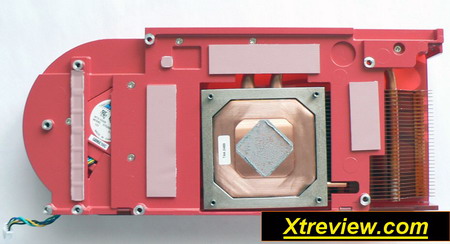 Actually it consists on five components. Rear metallic plate for memory chips cooling in the back video card side , plastic and metallic plate for memory chips cooling in the face side:
Copper radiator with two copper thermal tubes:  And finally a small fan:  In 2d regime the video card work at 506/1026 MHz (GPU voltage is lowered from 1.2 to 1.05 volts), and in 3d regime the frequencies rise to 743/1656 MHz: In this case the operating video card temperature is: 81C-> Core temperature during load and 60.88c in idle state 74.06c -->Ambient temperature during load and 66.06c in idle state Cooler RPM 1260.80 in idle and 2529.27 in load condition. It seem, that the temperature Of r600 is only 1 degree higher than G80 under the same conditions, but you Focus attention, that the fan frequency in 2d regime composes ~1260 r/min, and in 3d it immediately grows to 2500 RP/min (37%) and this is already noisy (41.4 dB against 34.4 dB in GeForce 8800 GTS). For the amateurs of loudly music :-) , rivatuner was able only to set the fan frequency to a stable 4580 RP/m here is the result obtained with such setting : 70.63C-> Core temperature during load and 50.13c in idle state 65.06c -->Ambient temperature during load and 53.06c in idle state Cooler 4580 RPM in idle and load condition. At this frequency the cooler noise was 57.7 dB witch is more than noisy . for overclock even with noisy fan the Video card was overclocked to 837/1908 MHz: The weak video card memory overclock tell again that the default memory access time is not always basic value of its overclocking potential. After video card overclock it functioned at following temperatures: 83.13C-> Core temperature during load and 69.50c in idle state 77.06c -->Ambient temperature during load and 70.06c in idle state Cooler RPM 1260.80 in idle and 2529.27 in load condition. Now, here is the cumulative data about noise , clock frequency and fan rotation speed for both video card :
4. Test configuration and testing procedure :During the tests of video card radeon HD 2900 XT and GeForce 8800 GTS 640 MB. we used the following configuration:
Taking in account that video card possess high performance, we overclocked the processor to 3375 MHz with 1.5v or + 40.6% over the default rating: 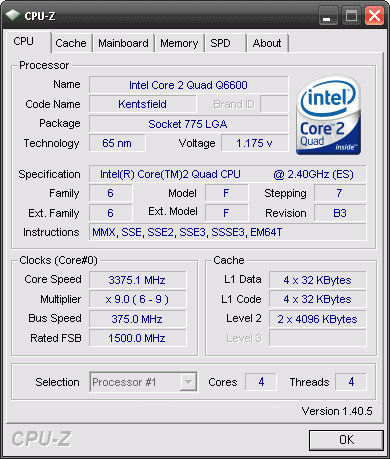 In this case the memory functioned at 1125 MHz with latency 5-5-5-12 with 2.10 v. DirectX 9 tests were executed under the operating system Windows XP professional edition SP2 (with the last updates - 15.06.07). Motherboard chipset Drivers - Intel chipset drivers version 8.4.0.1009a. We used the directX 9.0c (release date June of 2007), and also video card drivers : Catalyst 7.6 for AMD radeon HD 2900 XT and ForceWare 162.18 for NVIDIA geForce 8800 GTS. For DirectX 10 tests we use Windows vista ultimate edition (also with the last updates) with the same Catalyst version and ForceWare 158.45. All games tests were executed only in two resolutions: 1280 x 1024 (960) and 1600 X 1200 and the maximum graphic quality . Here is the two quality regimes used during our test:
We used following collection of synthetic benchmarks and games:
5. AMD radeon HD 2900 XT vs NVIDIA GeForce 8800 GTS performance tests and their analysisAs always, we start from futuremark synthetic benchmarks .
In both synthetic benchmarks the results as a whole speak about the same: Radeon HD 2900 XT is faster than GeForce 8800 GTS in default quality regimes . But by activating the anisotropic filtration and full screen antialiasing , the Radeon begins to lose. Focus attention, that performances decrease on AMD video card is larger than in NVIDIA after transfer to the qualitative regimes. It is necessary to recognize that the tests 3DMark reflected the common picture of entire today\'s review, only with rare exception in a pair of games. Now let us pass to the overclocked result : our video cards geForce 8800 GTS from Forsa has higher overclocking potential, than HIS radeon product , which allowed the first to be in performance equality for the regime High quality and to noticeably increase Nvidia card performance in the regime maximum quality. In this case let us note , that the overclock results of top end video card depend on the concrete copy;
The results of synthetic benchmarks are confirmed here with Serious sam 2 tests . The minimum frame -rate with Radeon HD 2900 XT is extremely low, so full screen antialiasing together with anisotropic filtering and HDR does not make a comfortable game play in the resolution 1600 X 1200. The considerable performance drop , on Radeon actually was confirmed by many users . In the simple quality regime the radeon HD 2900 XT easily outperformed its competitor, problem most likely is related to drivers . we hope to see some improvement in next months with newer drivers
Quake 4, show as a whole an insignificant advantage Of geForce 8800 GTS. Performance Drop in the qualitative regimes and resolution 1600 X 1200 is very high on both video cards.
Situation is again repeated: the Radeon HD 2900 XT is faster in regime without quality improvement (AA and AF) . But slower with AA and AF switched on. In our view, video card witch cost more than 450 US dollars should handle well antialiasing and anisotropic filtering .
Additional commentaries for elder scrolls IV: Oblivion, are not required. Drivers developers has to work on better driver for new architecture graphic chip .
In Prey we observe almost the same , as in all games tested above.
Finally we reached a game where Radeon HD 2900 XT is faster than GeForce 8800 GTS. The impressive overclock (for nvidia video card ) allow it to take revenge only in the resolution 1280 X 1024 with the activated full screen antialiasing and the anisotropic filtering In all other regimes AMD video card is just faster .
The popular game S.T.A.L.K.E.R. - Shadow Of chernobyl , give its preference to the video card geForce 8800 GTS . Unfortunately, comfortable play with the maximum quality setting is possible in both video cards only in resolution 1280 X 1024 or even below. Now the turn of four new games.
The 8800 GTS is just faster here , no more comments . AA and AF again kill completely the radeon video card .
Victory in High quality and defeat in most urgent actual for such card regime. is this good for 450$ cards ????:. Now a pair of tests under DirectX 10.
A confident victory for radeon HD 2900 XT!
A fantastic game, developed under NVIDIA assistance . the 8800 GTS has large victory here . ConclusionIn our view this review has to be updated with newer radeon driver . When new directX 10 games will be released with new drivers, we have to test again. However, as a hole the Radeon HD 2900 XT is faster than GeForce 8800 GTS in regimes without quality improvement and it is slower with full screen antialiasing and anisotropic filtering Taking in account that such video card are intended for high quality gaming then the geForce 8800 GTS 640 MB is better alternative . Furthermore, the GeForce 8800 GTS has less energy consumption, lower heat emission and cooling system is quieter than in Radeon HD 2900 XT. In addition the 640 MB in geForce video memory is always better than 512 MB in the Radeon card. Let us note that situation can change if AMD release better driver .... But until the moment the result is pretty clear.
we would be happy to answer for your question . if you have suggestion or comment
regarding this review our support would be glad to help just join our forum and ask u will get the best answer
to discuss check our forum section :-) RATE THIS REVIEW | |||||||||||||||||||||||||||||||||||||||||||||||||||||||||||||||||||||||||||||||||||||
![]()

Radeon HD 2900 XT 512 Mb vs 8800 GTS review overclocking and benchmark
Radeon HD 2900 XT 512 Mb vs 8800 GTS review overclocking and benchmark


7600gt review
7600gt is the middle card range.
We already benchmarked this video card and found that ...

 geforce 8800gtx and 8800gts
geforce 8800gtx and 8800gts  Xtreview software download Section
Xtreview software download Section  AMD TURION 64 X2 REVIEW
AMD TURION 64 X2 REVIEW  INTEL PENTIUM D 920 , INTEL PENTIUM D 930
INTEL PENTIUM D 920 , INTEL PENTIUM D 930  6800XT REVIEW
6800XT REVIEW  computer hardware REVIEW
computer hardware REVIEW  INTEL CONROE CORE DUO 2 REVIEW VS AMD AM2
INTEL CONROE CORE DUO 2 REVIEW VS AMD AM2  INTEL PENTIUM D 805 INTEL D805
INTEL PENTIUM D 805 INTEL D805  Free desktop wallpaper
Free desktop wallpaper  online fighting game
online fighting game  Xtreview price comparison center
Xtreview price comparison center 

- The new version of GPU-Z finally kills the belief in the miracle of Vega transformation
- The motherboard manufacturer confirms the characteristics of the processors Coffee Lake
- We are looking for copper coolers on NVIDIA Volta computing accelerators
- Unofficially about Intels plans to release 300-series chipset
- The Japanese representation of AMD offered monetary compensation to the first buyers of Ryzen Threadripper
- This year will not be released more than 45 million motherboards
- TSMC denies the presentation of charges from the antimonopoly authorities
- Radeon RX Vega 64 at frequencies 1802-1000 MHz updated the record GPUPI 1B
- AMD itself would like to believe that mobile processors Ryzen have already been released
- AMD Vega 20 will find application in accelerating computations
- Pre-orders for new iPhone start next week
- Radeon RX Vega 57, 58 and 59: the wonders of transformation
- ASML starts commercial delivery of EUV-scanners
- The older Skylake processors with a free multiplier are removed from production
- Meizu will release Android-smartphone based on Helio P40
- AMD Bristol Ridge processors are also available in American retail
- The fate of Toshiba Memory can be solved to the next environment
- duo GeForce GTX 1080 Ti in GPUPI 1B at frequencies of 2480-10320 MHz
- New Kentsfield overclocking record up to 5204 MHz
- Lenovo released Android-smartphone K8



computer news computer parts review Old Forum Downloads New Forum Login Join Articles terms Hardware blog Sitemap Get Freebies
